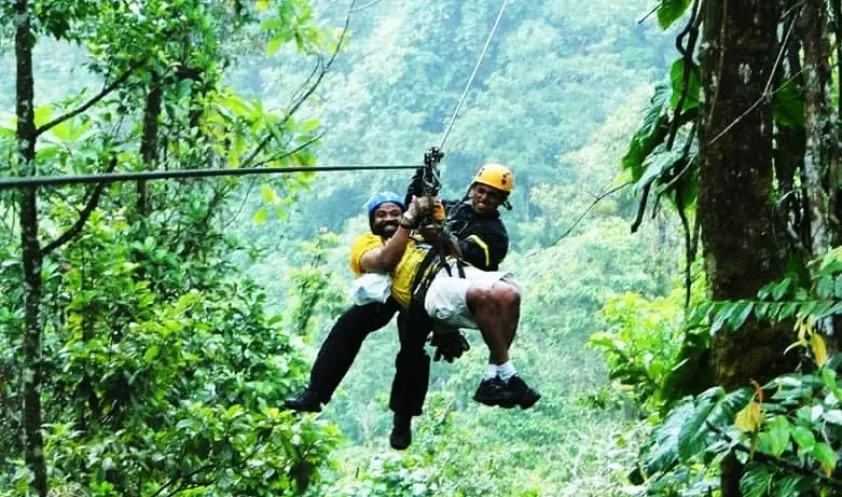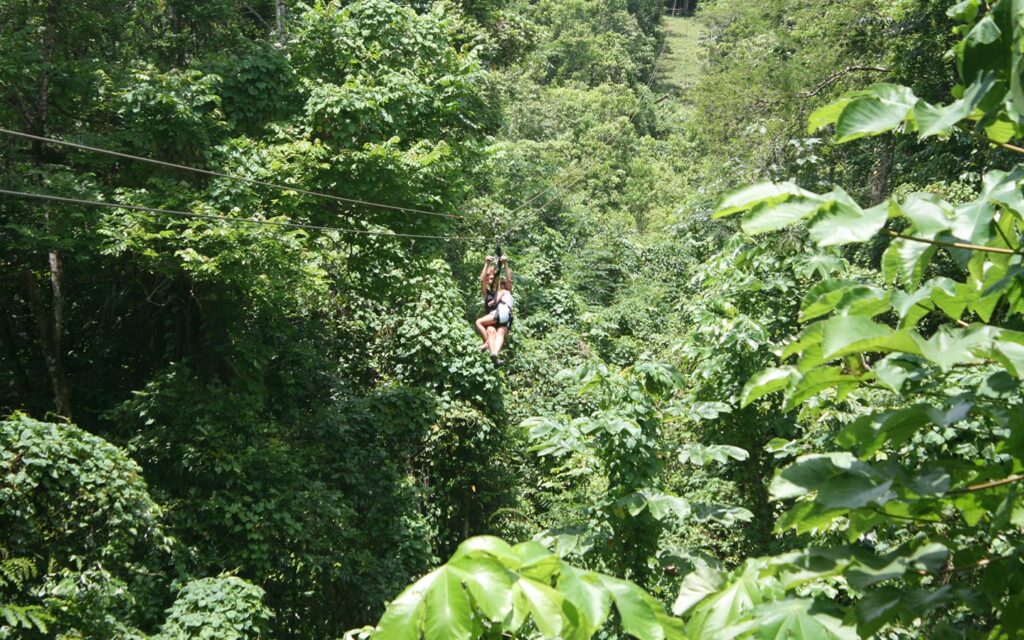Zip-lining in Nyungwe National Park
Zip-lining in Nyungwe National Park, Ziplining is an extraordinary tourism attraction scheduled to open in Nyungwe National Park. The precise dates remain unspecified, however the majority is expected in June 2025. Visitors intending to travel to Rwanda should not overlook this stunning pastime. It is an exhilarating experience that enables guests to discover the splendor of Nyungwe Forest National Park from the treetops.
Nyungwe Forest National Park, one of Africa’s oldest national parks, is located in southwestern Rwanda, encompassing about 1,019 square kilometers and bordering Burundi and the Democratic Republic of Congo. This forest park possesses a unique biodiversity unparalleled in East Africa. It consists of a montane forest that contains more than 13 species of primates, as well as many birds, animals, reptiles, amphibians, and several plant species. It was designated a UNESCO World Heritage Site due to its exceptional universal value and biological and ecological biodiversity.

The zipline excursion to Nyungwe Forest National Park.
Zip-lining in Nyungwe National Park, the Nyungwe zip line comprises several stations offering varied perspectives of the park. The zipline comprises segments measuring 350m, 580m, and 1020m in length, elevated between 50 and 80 meters above the ground, making it one of the longest ziplines in Africa.
The zipline activity commences at the Uwinka Reception Center, where participants receive instruction on the operation of the zipline. Subsequent to the instruction, they receive helmets and safety harnesses. The activity entails hiking from the park center to the starting location, which will be advantageous even for travelers with moderate fitness levels. Both seasoned and novice travelers can participate. The zipline traverses profound valleys and expansive woodlands, allowing passengers to have unobstructed vistas of the park’s terrain. It is a distinctive outdoor recreational activity in Rwanda.
Significance of the zipline activity to the tourism industry and the local community
Nyungwe ziplining is distinguished by its dedication to eco-friendly tourism in Rwanda. The tourism sector collaborates with local conservation organizations to maintain the park’s ecosystem and enhance the income of adjacent communities.
Proceeds from the ziplining activity are allocated for conservation efforts, as well as for the employment and support of guides and rangers dedicated to wildlife protection.
Travelers are encouraged to engage with the local communities following their exploration of Nyungwe Forest Park. They may explore tea farms and local craftsmen. These excursions offer an insight into Rwandan culture and customs through interaction and knowledge exchange with the locals. At the conclusion of these sessions, tourists may purchase local products as mementos, so contributing to the enhancement of their everyday standards.
It is feasible to combine ziplining and the canopy walk, as both are leisurely activities that permit aerial observation of the area.

The optimal period to experience ziplining at Nyungwe National Park.
Visiting Nyungwe National Park for the ziplining activity is most advantageous from June to September and December to February, since these months offer favorable dry weather conditions. These conditions facilitate rapid hiking and ziplining through the deep primate forest park, enhancing the quality of your excursion.
Additional things to do in Nyungwe National Park
In addition to ziplining, Nyungwe Forest National Park has a variety of more adventurous activities, including:
Tracking of chimpanzees:
This is the most prevalent activity in this park and is available throughout the year. Chimpanzee trekking in Nyungwe offers a thrilling opportunity to monitor and study these endangered species as they engage with one another and their surroundings. You will embark on a guided excursion into the bush, hiking for several hours in pursuit of chimpanzees. Upon locating them, you will observe them for one hour in their natural environment, acquiring knowledge about their behavior and social structures.
Canopy walkway:
This is an extraordinary experience that entails traversing a suspended bridge 50 meters above the ground. The canopy walk offers breathtaking vistas of the forest’s treetops, enabling a unique perspective of the park. This also presents an exceptional chance for avian observation and the surveillance of forest fauna from an elevated position. Distant lakes and mountains will also be visible. This exhilarating stroll lasts for two hours.
Trekking for Colobus monkeys:
This is yet another exhilarating endeavor in Nyungwe National Park. This woodland park contains substantial groups of black and white colobus monkeys, with each colony including at least 300 animals. Tracking Colobus monkeys is relatively simpler than chimpanzee trekking, as these primates are frequently observed in the woodland areas along the forest’s periphery.
Bird Watching
Nyungwe National Park is an avian enthusiast’s haven, boasting over 300 bird species, encompassing both native and migratory varieties. Birdwatching can occur in the woodland and marshes of the park. Common species include Grauer’s rush warbler, Rwanda’s black bird, African green broadbill, Mountain yellow warbler, among others.
Trekking and botanical excursions:
Nyungwe Forest National Park features numerous hiking paths utilized by visitors to investigate the park’s varied landscapes and ecosystems. Their difficulty varies from simple walks to arduous expeditions, accessible according to fitness levels.
The paths traverse the verdant forest flora, bamboo, and ponds. The trails include Igishigishigi, Umuyove, Karamba, Uwinka, and Umugote, among others. Regardless of the trail selected for your expedition, anticipate wildlife encounters, picturesque vistas, and enhanced knowledge of the area.
Excursions to tea plantations:
Located at the western boundary of Nyungwe Forest National Park, Gisakura tea plantation serves as an additional tourist destination where visitors can engage with the local population. This plantation spans 1,596 hectares and is predominantly overseen by smallholder farmers.
During your visit to the plantation, you may participate in hand-picking tea with the locals while listening to their narratives about daily life. Conclude the visit by sampling a cup of tea and purchasing some processed tea to endorse the program.
Community involvement and cultural experiences
Nyungwe Forest National Park is encircled by local populations that possess a profound affinity with the forest. Exploring these villages provides an opportunity to get knowledge about their traditional lifestyles and customs.
Your visit facilitates engagement in community-based tourism, allowing for an exploration of Rwandan culture and a profound comprehension of the park. Purchasing their handmade crafts enhances their livelihoods.
